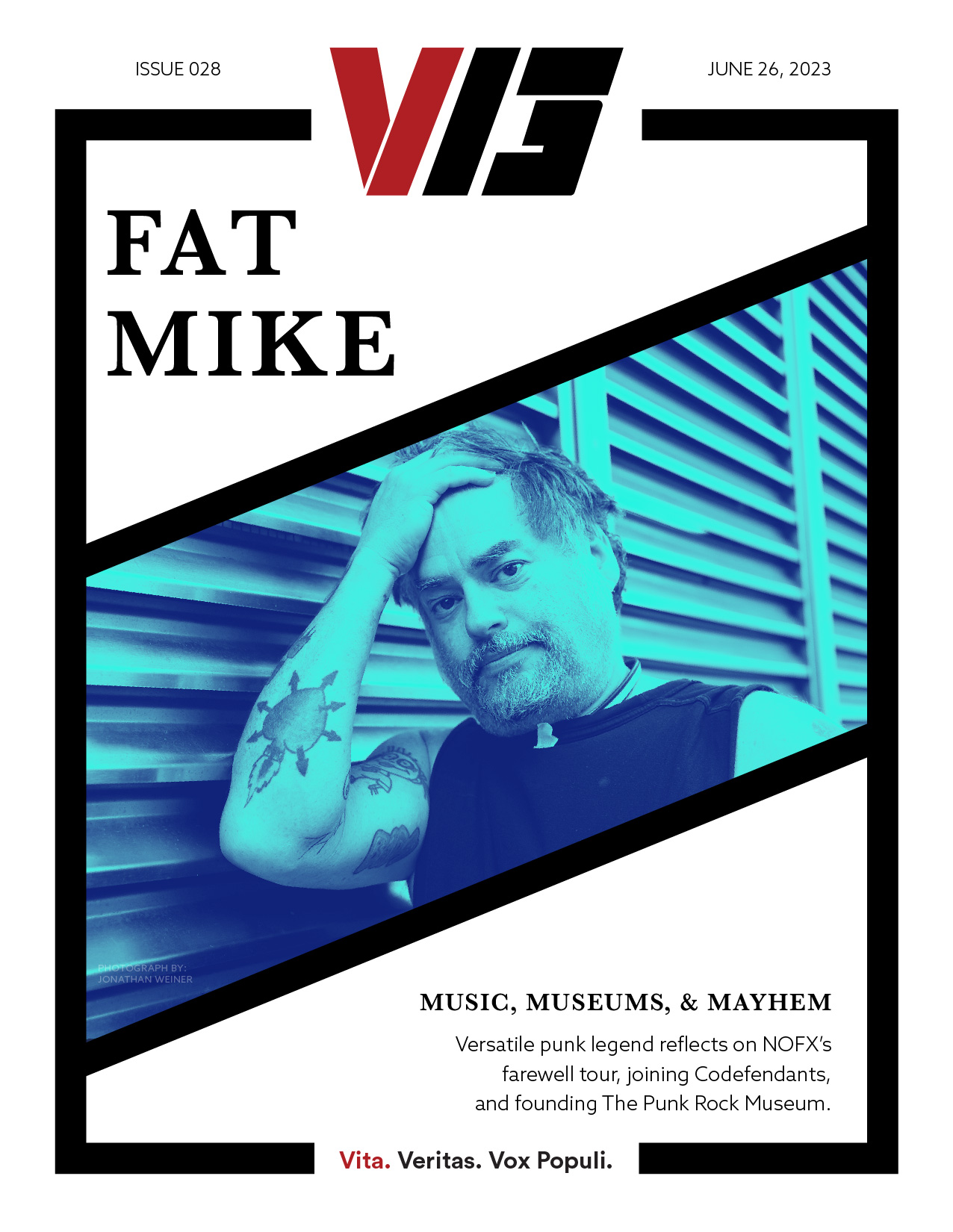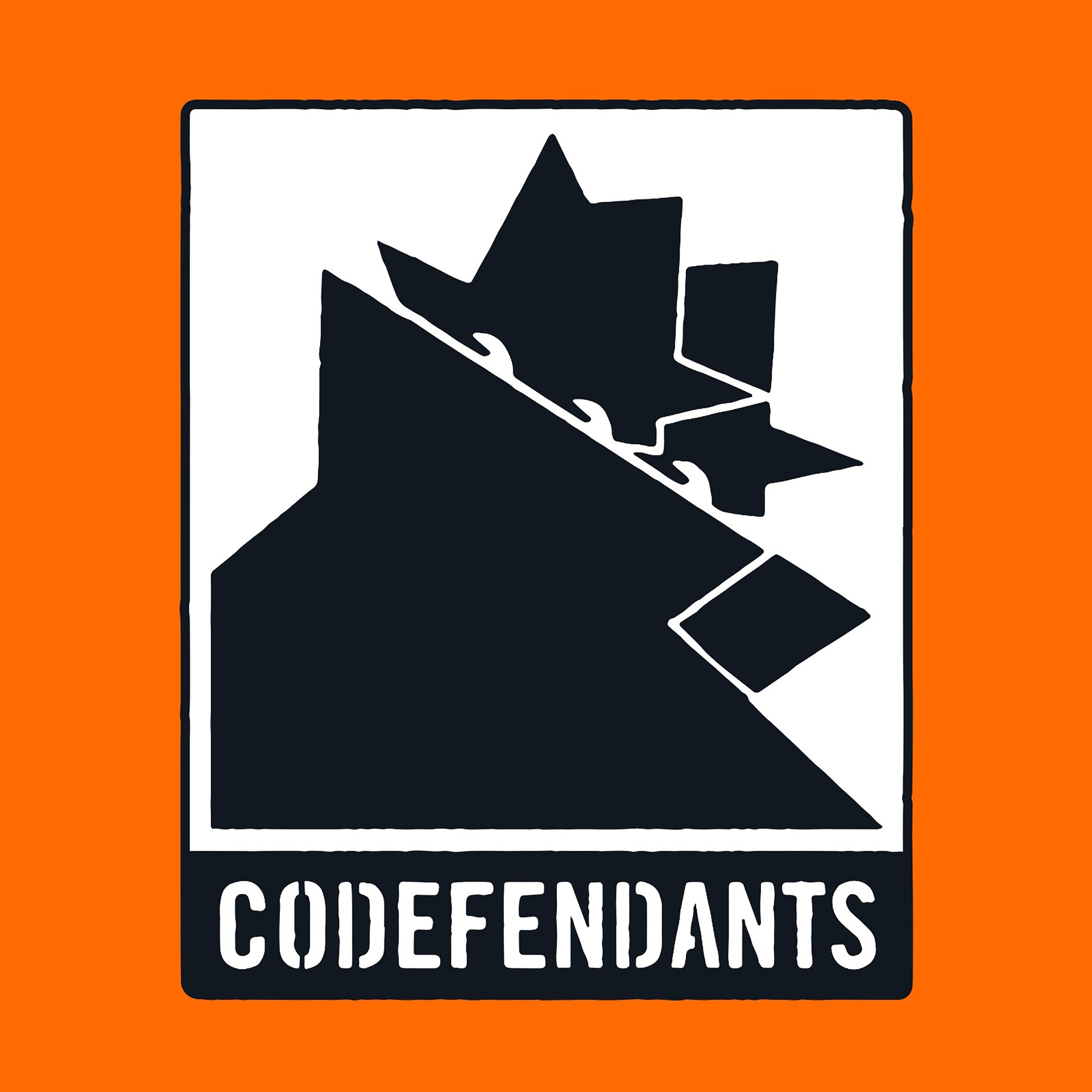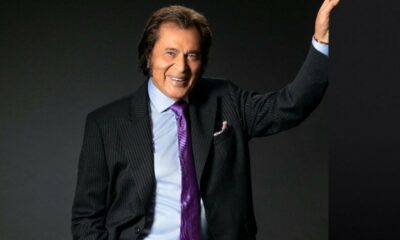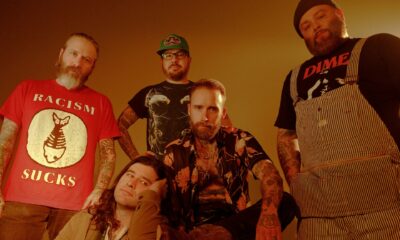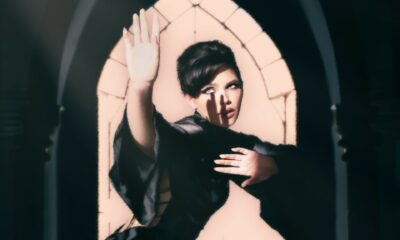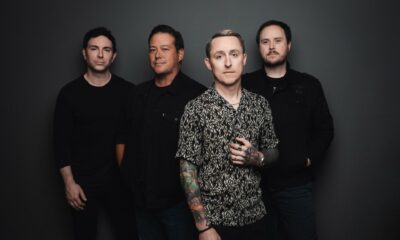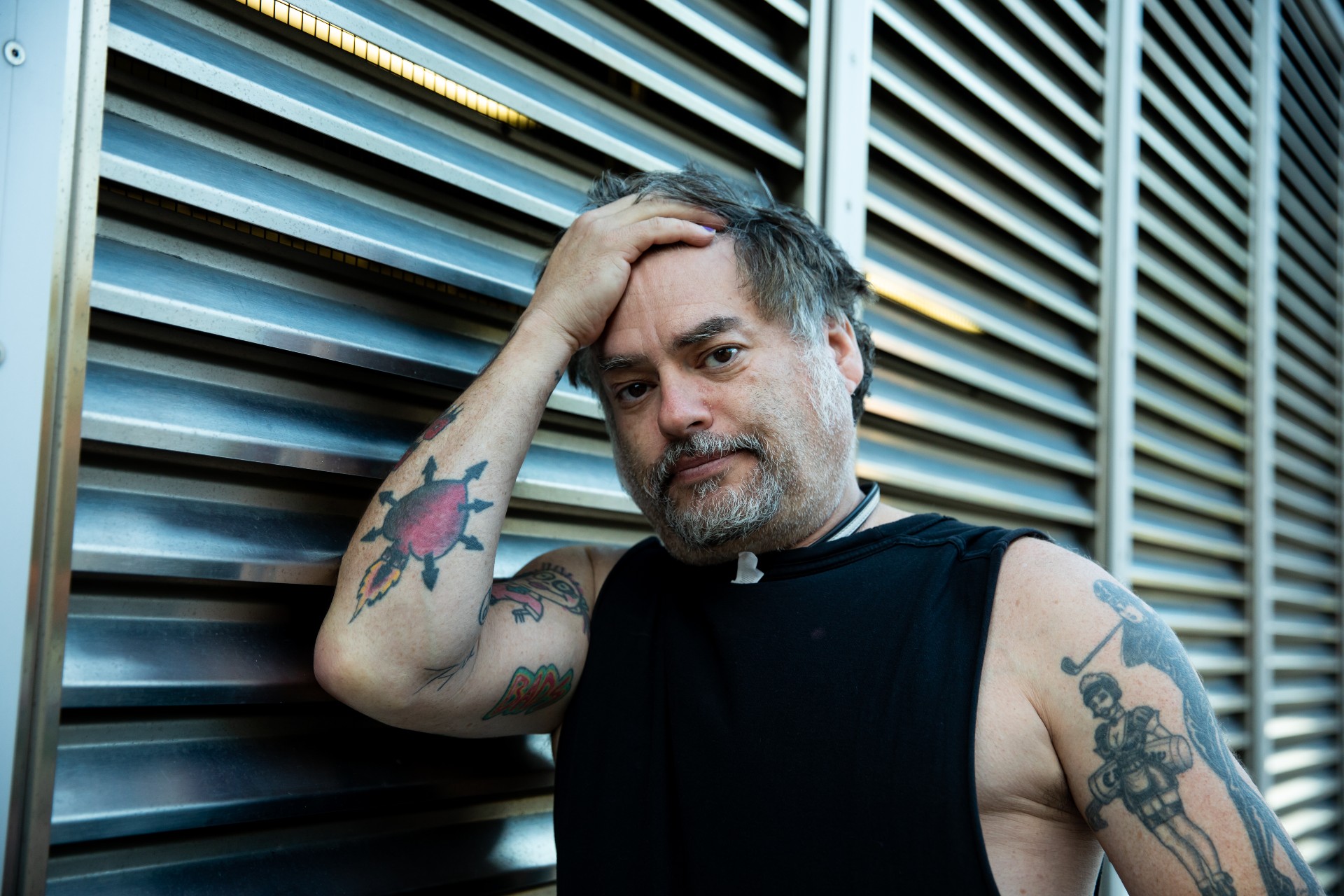

Hardcore/Punk
Fat Mike: “I can be whoever I want to be. And good people will treat me well. Bad people are always gonna treat me bad.”
In our latest Cover Story, the ground-breaking punk frontman, producer, and Fat Wreck Chords label head, Fat Mike, talks about saying farewell to NOFX, joining the Codefendants, and opening the Punk Rock Museum.
In the ever-evolving world of punk rock, few individuals have left as indelible a mark as Fat Mike, the charismatic frontman of NOFX. With a career spanning over four decades (not three, as I soon found out in our interview below), his raw energy, unapologetic lyrics, and rebellious spirit have ignited stages around the globe, earning him a dedicated following and an iconic status within the punk community. When he’s sober, he’s one of the nicest people on the planet, the saying in the community goes, but when he’s not… let’s just say his stories precede him. But as NOFX ambles through their highly anticipated Farewell Tour, the spotlight now shines on Fat Mike as he embarks on a new chapter of his musical journey.
Never one to rest on his laurels, Fat Mike’s restless spirit has led him to new and exciting horizons. Joining forces with the Codefendants, a group of talented musicians known for their electrifying performances, Fat Mike has unleashed a whole new level of intensity and collaboration. Together, they’ve crafted a sound that blends punk rock with a raw, unapologetic energy, pushing boundaries and thrilling audiences with their explosive live shows.
Beyond his musical endeavours, Fat Mike’s passion for punk rock extends far beyond the stage. In a bold move that cements his legacy, he founded the Punk Rock Museum in the heart of Las Vegas, a city synonymous with excess and rebellion. This groundbreaking institution pays homage to the genre’s history, showcasing memorabilia, rare artefacts, and interactive exhibits that immerse visitors in the raw, DIY ethos of punk rock. With its unapologetic attitude and commitment to preserving the spirit of punk, the Punk Rock Museum has quickly become a mecca for fans and an essential pilgrimage for those seeking to understand the roots of this influential movement.
But Fat Mike’s creative pursuits don’t end there. Embracing his natural gift for storytelling and captivating audiences, he has ventured into the realm of public speaking and standup comedy. Armed with razor-sharp wit and a no-holds-barred approach, Fat Mike takes to the stage, delivering thought-provoking insights, hilarious anecdotes, and unabashed truths that challenge societal norms and ignite laughter in equal measure. Through his unfiltered and courageous approach to comedy, he connects with audiences on a deeply personal level, leaving them inspired, entertained, and questioning the status quo.
As we sit down with the frontman turned label owner/producer/museum founder, we peel back the layers of Fat Mike’s life, delving into the motivations behind his latest ventures and discovering the untamed spirit that fuels his creative fire. Brace yourselves for an unfiltered and captivating conversation with Fat Mike, the punk rock renaissance man, as he opens up about his journey, his influences, and the insatiable hunger that continues to drive him forward.
You can watch the full video of our interview below, followed by our full write up.
Michael John Burkett, better known as Fat Mike, is a legendary punk rock musician, songwriter, and producer. As the founder and front man of the iconic band NOFX, Fat Mike has been a driving force in the punk scene for over three decades, known for his irreverent lyrics, unapologetic views, and outspoken personality. He’s become an influential figure in the punk rock community and beyond. Today I have the privilege of sitting down with Fat Mike to discuss his life, career, and the future of punk rock.
Fat Mike: “Oh boy. That’s all over. Four decades, by the way. NOFX, this is our fourth, it’s our 40th year.”
Did I manage to get that wrong? This interview’s over.
“Over three decades or something. But it is over three decades. You were right.”
But only in the most technical way. You guys are currently doing a farewell tour, which really was a knife in the heart because War on Errorism, of all the albums, that was the one in high school, such an important album for me growing up. I don’t know, it’s one of those things where you’ve had such a breadth of discography: which are your favorite albums to play songs from?
“Well what’s interesting is- I mean, all of them- but it’s interesting you say that, because I really feel like NOFX since the early 90’s has been putting out quality records. You know, War on Errorism was one of our, like, what- after a band does three or four records, people don’t generally care that much, and we were really bad when we started. But War On Errorism was a really important record for us.
“It was the first NOFX record on Fat Wreck Chords. It hit number one in the independent charts and billboard. And we never did that before. And it was our first- we’d always talk about politics, but it was our first real political statement. And yeah, it is an important record. But it’s nice, a lot of people will pick 12 different records, was more important to them. And-”
That’s a good thing, right?
“That’s a great thing. And one of my, it was so flattering to me, it made me feel so wonderful was when Single album came out, about two years ago, it was a different NOFX album, but it got the best reviews we’ve ever gotten. And getting the best reviews this late in a career? Pretty fucking awesome. It made me feel so good.”
Yeah, a hundred percent. And with that this farewell tour, what have been the highlights so far? You guys have been, it’s been a massive tour, so…
“Well, I know it will be a massive tour. We’ve only done, what we’re doing is we’re doing 40 cities and it’s over the next year and a half. We did our first one, which was Austin, Texas, and we did two nights, 80 different songs, and it was it was exactly how I, I had hoped. It was very emotional.
“We practiced – we never practice – we practiced for six days, you know, in Austin, to learn these songs, cuz a lot of these songs we’ve never played. And generally the songs you don’t play are the ones that are really hard. But we learned them all and we played longer than we’ve ever played, and people were just so stoked and, you know, lots of tears on the second night. And, you know, this is our farewell tour.”
“Is it a cash grab? Well, I mean, we’re making money because they’re all in our own venues that we found around the world where: they’re not Live Nation; they’re not AEG – they’re campgrounds and they’re parking lots. And we bring in our own stage. It’s our merch, it’s our bar. So it’s like it, it wouldn’t have made sense if it was just another tour cuz we draw, you know our 2000 or 2,500 people, but now San Diego next weekend is 10,000 people sold out, which we don’t draw those numbers, but because it’s our last tour… It’s not like we’re charging a lot of money. It’s just we own everything now.”
Yeah. I mean, when the artist is cut in-
“And it’s, it’s our final tour and what’s so cool is that we get to say goodbye. In a meaningful way. And because a lot of these people have been coming to scenes for 30 years or more, and it’s our way to thank everybody by playing songs we’ve never played. By practicing.
“And what people should know is that this is not a Black Sabbath or Motley Crüe thing. This is our final tour.”
So if you wanna say bye, do it now. Now or never. And who are you most grateful to be saying goodbye alongside? I mean, I’m sure that you know certain fans in certain cities and you have for decades, but I’m wondering who are you, you know, happy to be doing this with?
“Well, we’ve had our crew forever, for decades. Yeah. We’re getting different bands, you know, it’s not like a tour with all the same bands. It’s always different bands. Pennywise have been our bros for forever. They’re on a lot of the shows. We just played with them and we played with the Subhumans who’re one of our biggest influences and great guys and the Circle Jerks and every band we’re friends with is gonna be on one of the shows.”
It’s gonna be like a who’s-who of punk.
“Who’s who of old punk. Some new bands like my other band, the Codefendants, we’re playing a lot of the shows.”
And that’s a perfect segue actually because I wanted to talk a bit about whether there’s gonna be a little bit of more of that, front and foremost, cuz I know that that’s your big new project. And having listened to it, I was really curious about what the genesis of this was.
“Just Sam [King] from Get Dead, you know, I’ve been producing Get Dead records for a while, and we’re dear friends and he introduced me to Cheschi [Ramos]. He goes, “I know you don’t like hip-hop Mike, but this guy’s really good.”
“Because I don’t like hip-hop. I never have, you know. I don’t own one hip-hop album. But I heard Ceschi and I heard like two songs they had. And then I said, “Would you guys, would you guys be interested in having me produce?” And both of them were like, “Fuck yeah.” Cause the last Get Dead record I produced did really well.
“And, and then after I was producing, they’re like, “Mike, we just want you in the band.” So, and I was really flattered. And I mean, cuz what I bring as a producer is really different than anyone I’ve ever met. And people don’t know that. There’s probably a few people that do it. I’ve never worked with anyone who does it- what I do, which is: I change chord progressions and melody in a way that people don’t really even notice.
“And in the Codefendants especially, half the songs, when Ceschi sings a verse, it’s a different chord progression than when Sam sings a verse. So not only is it different voices, but the melody, the melodies kind of stay the same, but the chords change and it makes it so much more interesting.
“And the cool thing is no one even notices ever.”
I mean guilty as charged. I’m like, wait a minute, how did-
“Like “Defcon,” which is one of my songs, there’s an eight chord chromatic progression. You can’t even hear it. It’s just what, it’s what makes it catchy and cool. And when you do a chromatic progression, there’s usually one note that you can play with every chord.
“So that’s what you hear. But the melody is really pulling off the chords. Anyway. And in “Disaster Scenes,” there’s three different singers and every one of their choruses is on piano, and it’s completely different. Like, one of ’em, like, you know, it’s, there’s, you know, most of ’em are in 4/4, and one of ’em is in… 4/8? 4/8 yeah, the chords change faster.”
Wow.
“And don’t even fucking notice it. But now you will.”
Yeah. This is gonna be one of those things where I will not be able to not observe that from now on, but that’s cool.
“All over the album like that.”
And where does that come from? Is it just, is it- is it knowing that when you experiment with things just a little bit differently- is there a specific result you’re looking for?
“Just, it’s how I’ve been writing songs for fucking decades. You know that song “Eat The Meek?” It’s a popular NOFX song.”
Yep.
“Each verse has a 16 chord progression, and they’re different each time.
“No one notices. That band, Pepper covered it. They go, “What the fuck, dude? This is a reggae song. Why are there-?” And they go, “This is the hardest song we’ve ever had to learn.” And that song, I fuck up that song more than any other song because the chords are always changing.”
Right. God damn.
“So it’s just like, it’s, it’s how I write songs. I also don’t use choruses, very often, you know, our biggest songs, there’s no chorus. People don’t realize that like “Linoleum” or “Bob,” there’s no chorus.”
I feel like this is one of those things where as a teenager you’re like discussing it with people completely. You know, high as a kite, and you’re like, “Man, did you notice-?”
“No one notices we don’t have choruses.
“I mean, every band in the world, they have choruses in their songs 99% of the time. But I’m more of a storyteller and I’m not gonna sell the, I’m not gonna tell the same story four times in the same fucking song. To make the songs more memorable when you hear ’em once on the radio.
“I’d rather people listen to my band four times more often.”
Fair enough. And I think that you do have that impact on people. Just looking at the ability to connect with fans. I mean, no better example in my mind: I’m from a small town in Ontario, but I went to shows in Toronto and it was because of “She’s Nubs” that I discovered and learned about Talli [Osborne], from-
“Talli? You know, she’s gonna be at my house after this interview.”
Oh, serendipity. Because I wasn’t able to get like a proper face-to-face interview with her, but I just asked a couple questions about the Punk Rock Museum, which I guess that’s as good as a segue as any I wanted to see-
“Before that: I’m doing Talli’s record. We’re finishing it today.”
Is that why she’s coming over?
“I’m releasing her album, yeah. And let me tell you, it’s a pretty fucking cool ass album.”
I’m so excited. Just cause I, I had-
“No one’s expecting it.”
I wasn’t aware that she was even like, oh man, cuz you, I looked up her, you know, you do your research, right? You do your research-
“I’ll send you our first rough mix after this interview.”
[stunned]
“So: museum.” [smiles]
Yeah. Museum. My god where do I even… you’ve been all over the socials for this. It’s been remarkable. I feel like you’ve been godfather of punk in many ways, but now godfather of the Punk Rock Museum in many ways.
“Well, I mean, I… my idea about the building, I moved to Vegas for it, even though Vegas doesn’t like me.
But now that it’s- my life has changed for the better so much since we finally opened because so many people didn’t believe in it and wanted me to fail. It’s just how people are. You know, and, and the city took a long time and, and there was a lot of setbacks. But once we opened it’s such a magical place.
“Every single person leaves smiling and thankful and emotional because just like you said that you listened to ‘War On Errorism’ in high school and it’s like a, a touchstone for your life. There’s a place in this museum where everyone goes, “Oh my God, I remember when I was 21 and this meant so much to me,” and, “Holy shit.””
“And people start tearing up and, cause it’s five decades of punk, it’s not, you know, 70’s, like most museums, right? It hits everybody. Like upstairs, we have some used stuff- um, not used: from the band they used. And you can play our guitars upstairs. You know, you can play Tim Armstrong‘s original Rancid hollow body.
“You can play my bass. You can play Joan Jett’s guitar through our amps. Pat Smear gave us his original Germs guitar, which you can play. We’re getting Lemmy‘s bass and his rig.”
What?
“Yes.”
I mean, I knew that you could play some rigs. Like I, I knew this. I was already aware, but like some names that you’re telling me, I’m like-
“We have the axe guitar, Chett from Wasted Youth. We have Wesley Willis‘s keyboard you can play. It’s… and we’re getting more and more. Now that it’s open, people are like, “Oh, I wanted to be in!”
“We have Norwood from Fishbone’s bass, you know, we have killer shit.”
It’s funny cuz I was speaking with Keith Morris last week and I, and I asked him about it and I was like, “Did they approach you?”
And he’s like, “Yes they did. And I won’t lie, like, you know, I was a little hesitant and stuff, but now that it’s out there, you know,” and first of all, that’s a terrible impression of Keith. But secondly I, it’s funny though cuz it does show that I have seen this like outpouring now of support that now it has, it has opened and now it is absolutely receiving the acclaim all over because people were very serious about this. And it looks like, and this is a very important point and I wanted to point to, to share with you, is that it seems that you picked really, really dedicated professional people for something that has historically been viewed as just kind of like, not all together, very rebellious, but without a plan kind of thing.
And it’s, and a museum is such the opposite of that, right?
“It’s funny cause. That’s why people… I mean, people don’t trust me. Like, “Oh, Fat Mike, he’s a fucking drunk and cokehead and he never follows through on anything, he talks shit.” And it’s like, no. I do everything one- I give a hundred percent to everything.
“It may not seem like that, but you know, like when I started Fat Wreck Chords, every single record I produced, I wanted every song to be great. You know, and then years later at Fat, I’m like, “All right. You guys are on your own now.” No, I’m, I’m doing other stuff now, but I, I like to, I do like to start things and then kind of move on to something else which is what I’m doing now, you know, NOFX. I’m, I’m done with NOFX soon. Codefendants is my next big project, but I’m, I’m gonna go into standup and public speaking cause I have-”
Sorry, you’re gonna go into standup?
“I’m gonna go into standup, yeah. And- but more importantly than that I want to, I wanna do TED Talks. I think that’s where I can bring the most joy to the most people.
“Cause I got a pretty good, good grip on happiness and how to get there. And, people don’t. People have no fucking idea. They think it’s funny, or, “One day…” No, it’s right here, you fuckin idiots. You just have to be strong enough- or not, not strong enough. You can’t be shy about it or, or a coward. You have to realize what really makes you happy in life.
“And then, you get a job, or you figure out how to make money so you can do this. Sometimes it’s, it’s the job, but that’s, no. People think it’s money. It’s not. When I was in my van for four and a half months when I was goin to college, I was just as happy as I’ve ever been. You know, it’s about finding your happiness.
“So people go, “Well, you, you make people happy when you tour with NOFX. Yeah, but I’m showing people happiness for an evening. I wanna actually help people learn how to find their happiness so they’re happy every day. I know it sounds hippy-dippy or whatever, but you know, as a sex therapist, as I studied sex therapy in college and social science, and I I like to think I, I keep figuring out ways to make people joyful.
And the Museum is, is one way and, I’m go back to it, my heart is so full every day when I go there.
“I’m gonna tell you a story. This, this just happened three days ago and I’ll send you a photo if you wanna post it somewhere, cuz this was for me, it was incre- it was one of the most incredible days of my life.
The Jewish Journal is doing a story on the Museum. So I’m walking this reporter around and these two Arabs, the first two Arabs that have been to the Museum, I mean they’re probably Muslims or Arabs, but these guys are Saudis and they have fucking, they have the checker, the the white and red checkerboard scarves on. I’m like, “Arabs! There’s Arabs here! Hey, come over here, I’m doing an interview with the Jewish Journal!”
“And, came over and they were like looking at each other, you know? And it was. Oh my God, it was just, it was amazing because his name was Omar and his son’s name was, you know, Omar. They had a band called Paint the Town Rad. And he’s like, I had to bring my son to the Punk Rock Museum.
Now… so we’re hanging. And then a Hasidic Jew walks in. He was fucking “HaSid Vicious“. Okay? And- with his wife, and they both had their big ass yamalkes on, and he had Payos, you know, those curly things on the side. But they were straight. Like, “Dude, you use hair straightener in your Payos?” And they laugh.
“And I go, “Come, come meet the Arabs!”. And they, they did not wanna meet cuz he’s like hardcore, he’s Hasidic.”
Right.
“And I was like, “How about that Israel-Palestine problem, how about that? I go, “Wouldn’t we have been better off after World War II if the Jews got Bavaria? Wouldn’t that be cool? Because instead of putting them surrounded by enemies,” and everyone’s like, even the Hasidic Jew was like, “Well, you know, Israel’s the holy land. But… yeah, Bavaria would’ve been pretty nice!” [laughs] So-”
Wow.
“Then it doesn’t, it couldn’t even get weirder. But Rikki Ercoli is one of our- he is an- a photographer that took photos in ’77 to ’87 and like, and he’d never had his photos shown anywhere in his life. And his friend contacted us, and we said we’d be interested because, I mean, he’s got these crazy pictures of Sid Vicious and Circle Jerks, and just like GBH, like all these bands, and we had an opening for him and he said “I was so poor, I could only afford one roll of film. When Sid played at Max’s, I only had one roll, so I had to like, make sure every photo counted.””
Oh my God.
“And he, and he was like, “And that’s before I could figure out flash photography.”
Anyway, so he shows up with his gay leather cowboy daddy.”
It just gets better. It just keeps getting better. I love it.
“I’m like, “The gays are here now! Gays! Come meet the Arabs and the fucking Jews.” And then- I have a photo with all of us in there.”
Do you actually? Oh my God.
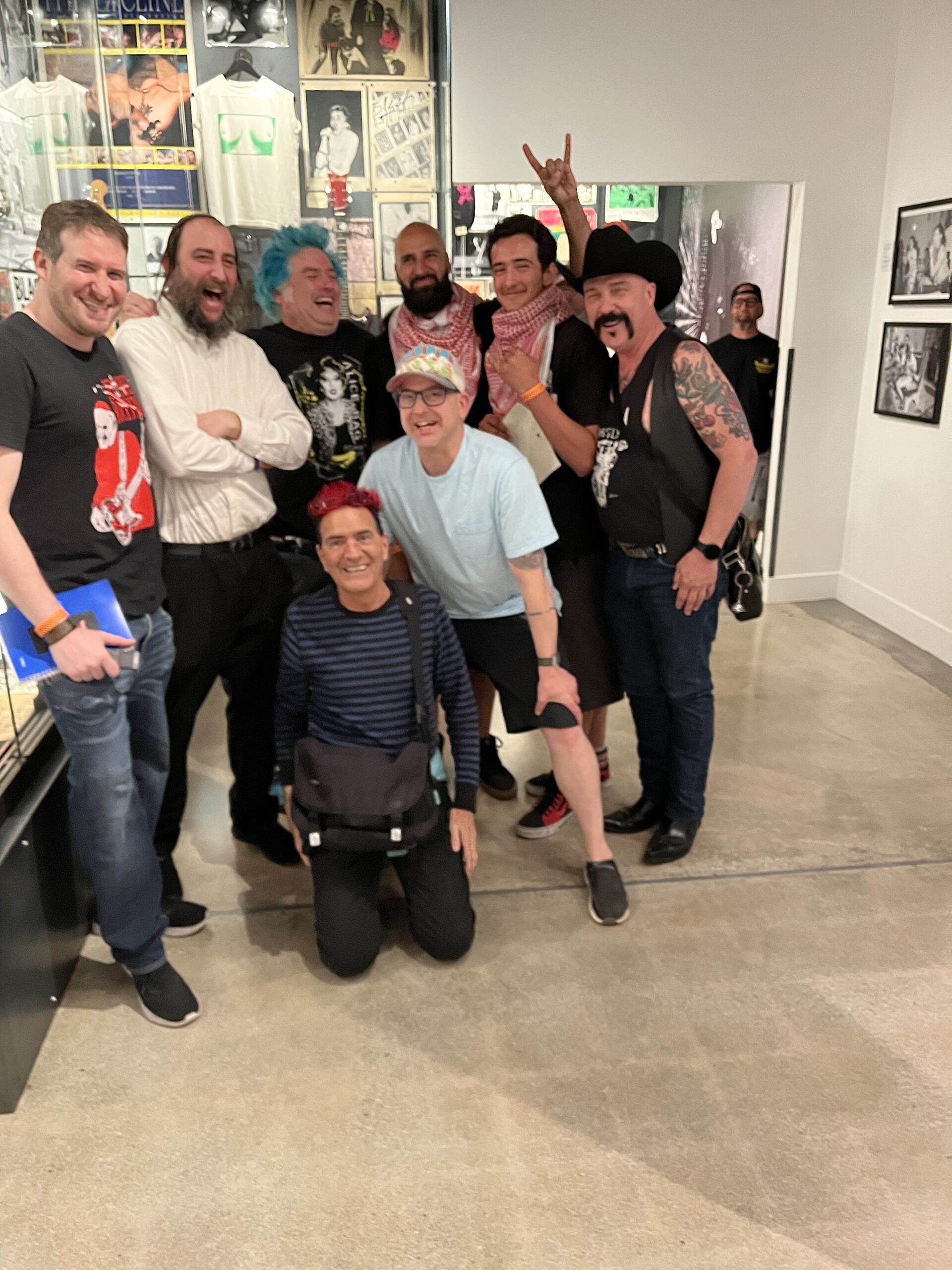
Photo Credit: Melanie Kaye, Dir of Publicity & Promotions @ Punk Rock Museum
“Yeah, I’ll send it to you… and then 10 minutes later we’re at the bar. Everyone is talking about their favourite punk bands and how they got into music, and I was, I was, I was so emotional. It’s like we have fucking Arabs and Hasidic Jews talking about the one thing in the world they have in common.”
Right. Damn.
“It, it hit me like, wow. Because punk rock affected a lot of people, but what it did is it saved people’s lives. And it gave people who felt like they didn’t have a place in this world, like they had a place.
“And… it was like, how could that happen? That one day in the one half hour, it all happened and it was like, it was a sign from God, you know? No it wasn’t [laughs] but it was one of the best things that I’ve ever seen. All these enemies, you know? Talking about the one thing they had in common.”
I mean, if you, if you wrote it, somebody would tell you, “That’s a bit on the nose, don’t you think?” But,
“Right? Yeah. “Actually that would never happen,” but I have it here documented. And the Jewish Journal, the reporter was there, recording it all on audio recording, but there’s tons of pictures. I’ll send you one.”
That’s amazing.
“I just can’t make this shit up.”
No, you really can’t. That the part that like, all of the best opinions I have of punk & of hardcore and all the things that it’s done for me and it’s done for others that I’ve seen: that is such a crystallization of everything all in this one like mise en scene, I guess you you’d call it. Like that snapshot, you know, man, that’s a…
“And also respect. The respect everybody had for each other. It’s like, “Oh, we’re not gonna talk about our differences. We are in a church right now.”
“We are in the church of punk rock, which is what it is. And people are so respectful. Like everyone is worried about, “Oh man, this place is gonna get trashed. Some drunk punk rocker is gonna-“. And I’m like, I don’t think that’s gonna happen. Sure we have things behind glass, but in the guitar room where you, you know… Well, okay, the first day someone dropped my bass and something broke off it, but you know what? We fixed it.”
Okay. So, that kind of says it all, doesn’t it? At the same time? Like things get rough and tumble, but-
“Yeah! All these guitars were on tour with us. They had to get fixed all the time and how I sold people on this was, “Do you want this guitar to be in a closet or storage unit, or do you want someone to play it and to change their life?”
“”Oh my god. I just got to play Tim Armstrong’s Ramsey guitar.”
“That could be a life defining moment and- not could, it is. Not me, cuz I’m not left handed. But for all those Flanders out there.”
Yeah. Right. It seems like that combination of irreverence, authenticity, which has kind of been your mainstay, I would say.
“Oh, I’m, I’m- if there’s one thing you can call me is: I’m authentic.”
Yeah.
“And irreverent. And you know what? People don’t like that.”
No, not generally. On either side of the polar opposites that we have now.
“No, people don’t like someone who is happy. And, kind of, successful. When people are joyful, people look at that person and be like, “What are they so fucking happy about? Who’d they fuck over?”
“Oh no, it’s that you don’t fuck people over. That’s how you become joyful, dumb-dumb. I mean, yeah, I talk shit about people cause I think it’s funny, but… I’ve never, I’ve actually never done anything hurtful to anybody purposely. I’ve hurt people, sure. But never to actually hurt anybody.
“And, you know, I’ve never lied or cheated either, or taken revenge. That’s part of the thing about happiness, is: if you don’t do anything bad to anybody, it’s half the battle.”
I kind of wanna sign up for this religion, man. I’m into it. [both laugh] No, I mean, I really do think that you’re onto something with respect to being able to speak about it, cuz there’s another side to punk that you and I both very well know, which is not just self destruction. I’m talking immolation – like, dunk the gasoline all over and just light it on fire.
And there’s that essence of punk that everyone knows about, but the truth is a lot more complicated than that. And I think that you are well placed, I think, to speak to: why is it okay to be happy? And how do you do that?
“Right. And I, I know a lot of what I’ve gone through in my life. You know, I wasn’t free until I was 46. And I got these words tattooed on me.” [shows right forearm]
“”DON’T DREAM IT BE IT” from Rocky Horror because they haunted me. Every time I heard that song, I’m- it’s the first record I ever heard. And it’s meant so much to me. And I’d hear those lyrics, “Don’t dream it, be it.” And I’d think, “I’m a coward. I’m a coward because I’m not being who I wanna be. I’m scared.”
And I was 46 when, when it was the last hurdle for me, which was cross-dressing in public. And it was just, it- I felt punk rock again. I was in Luxembourg. I wore a pink slip down the street. And people were like… I went to dinner at a very nice restaurant and you know, the waiters and everyone treated me very well.
It’s a nice restaurant. And they treated me like people should treat people!”
Right.
“And I just learned that lesson. I’m like, “Huh. I can be whoever I want to be. And good people will treat me well. Bad people are always gonna treat me bad.” And you know, someone I dated, they made me feel beautiful.
“And it’s- it’s kind of mean to bring this up, but it’s not- I’m not being mean, but my first wife told me I look stupid in women’s clothes, and it absolutely broke my heart. And we ended up breaking up soon after that.
Cuz I’m like, “Oh, well you’ll never see me in anything again.” And you know, six months later she’s like, “Why don’t you put on that maid’s outfit?” I’m like, “You told me I look stupid. I, I can’t.”
“So then the next lady I was with, Soma Snakeoil, she’s like, “You’re beautiful and I’m gonna show you how beautiful you are.”
”And she did. And what a gift. To make someone feel good about themselves. And it’s just a win-win, making other people feel good about themselves. So that’s why I’m public about it now. It’s not like, “Oh, Fat Mike is trying to catch on with the trans, you know, cool factor right now.” No.
“And what Soma said about me is “I didn’t transform you into anything. I revealed who you really are.” And, beautiful words.
“This is why I think I should be doing more public speaking.”
I’m struck because I’m actually seeing you’ve given this some thought, but also like, again, authentic and genuine and irreverent. And that’s been your brand forever. But, and I hate to say brand sorry, but it, that’s been your medium, your mode. The way-
“Well, that’s how punk rock was, what it started out as, and it stopped doing that. Bands started singing. I mean not all bands, but it turned into more like, “What do people want to hear?” And I’ve always-”
“What’s the algorithm want now?”
“Yeah. And I’ve always told people what they don’t want to hear, but they should hear it. And I like songs that touch 5% of the listeners. Not a hundred percent, but I want that song to touch people.”
That’ll be a fanatical 5% though. Yeah, I see.
“Well that’s why NOFX had such a wonderful career, and we’ve had so many loyal fans – and why I want to say goodbye to them.”
Right. And you’re doing it in a massive way.
“That’s why I want everyone to know how authentic this is. We’re going to cities that have meant so much to us. And every time I say thank you so much for coming to see us over all the years, I start crying. Cause I mean it. I’m not doing Ozzy, like, “I love you all,” you know?”
Yeah, no, I know exactly what you mean. Well, I’m hoping to catch you at, at one of those dates. I, and I’m also really-
“Why can’t you?”
I’m, I- not that I can’t…
“I’ll put you on the half price list.”
I’ll pay full price, fully. I’ll, I’ll pay full price and
“I’ll get you on the backstage VIP shit.”
I mean, that’s… [pause]
I’m trying my best to accept gifts that are presented to me. So I am going to say: “Thank you Fat Mike, and I appreciate this offer, and I will accept it, even though everything in me is saying, oh my God, don’t do that. I massively appreciate that.
“This is actually one of my favorite interviews. I think I’m kind of nailing it.” [Laughs]
Yeah you kind of are. And I wanted to say it’s been such a pleasure to speak with you. I know that we’re getting close to the end of the time… we’re so pleased that we got the opportunity to speak with you.
“I have a question for you though, I’ve been thinking about it for a while now.”
Yeah?
“What do you live in, an octagon?”
[pause, followed by explosion of laughter as I realize he’s referring to the weirdly octagonal shape of the room I’m video calling him from]
“You live in a fucking stop sign room.” [both laugh]
Yeah, right.
“Fuck dude. This is-“ [laughs]
It’s an old, converted manse, and now… It’s like, “We’re gonna make three units out of it!” Like, what…
“Jesus Christ. I mean, I’m-” [laughs]
It’s a strange room.
“Like you live in a fucking beehive. I understand those are hexagons, but-” [both laugh]
[pulling myself together to try and deliver some semblance of a sign off] All the best and we look forward to your new releases coming up soon.
-

 Music1 week ago
Music1 week agoTake That (w/ Olly Murs) Kick Off Four-Night Leeds Stint with Hit-Laden Spectacular [Photos]
-

 Alternative/Rock2 days ago
Alternative/Rock2 days agoThe V13 Fix #011 w/ Microwave, Full Of Hell, Cold Years and more
-

 Alternative/Rock1 week ago
Alternative/Rock1 week agoThe V13 Fix #010 w/ High on Fire, NOFX, My Dying Bride and more
-

 Features1 week ago
Features1 week agoTour Diary: Gen & The Degenerates Party Their Way Across America
-

 Culture1 week ago
Culture1 week agoDan Carter & George Miller Chat Foodinati Live, Heavy Metal Charities and Pre-Gig Meals
-

 Music1 week ago
Music1 week agoReclusive Producer Stumbleine Premieres Beat-Driven New Single “Cinderhaze”
-

 Indie2 days ago
Indie2 days agoDeadset Premiere Music Video for Addiction-Inspired “Heavy Eyes” Single
-

 Alternative/Rock2 weeks ago
Alternative/Rock2 weeks agoThree Lefts and a Right Premiere Their Guitar-Driven Single “Lovulator”

